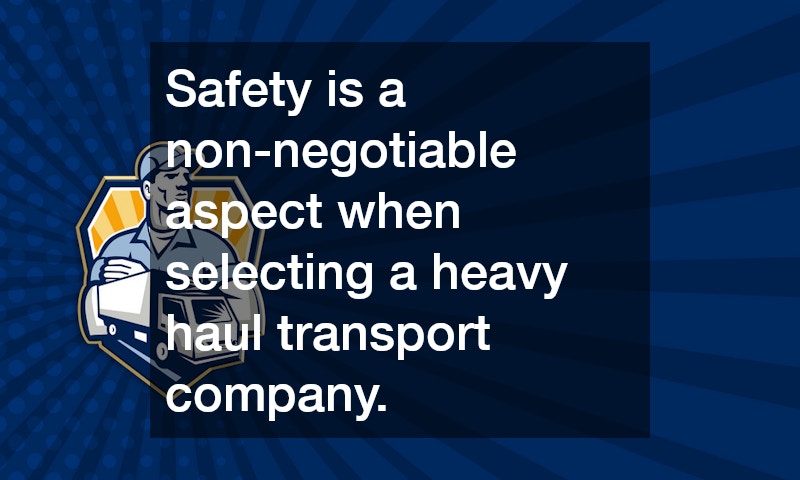As industries continue to grow and diversify, the demand for transporting massive equipment and oversized loads has become a critical part of logistics. Heavy haul transport companies are at the forefront, offering specialized services that ensure safe and efficient delivery of large loads. Selecting the right heavy haul transport company is crucial for the success of any project involving oversized freight, and this article will guide you through key considerations to evaluate before making your choice.
The complex nature of heavy hauling demands expertise and reliability. Business owners must carefully assess potential transport partners to avoid costly delays or damages.
An understanding of what distinguishes a proficient heavy haul transport company from an inadequate one is invaluable, serving to maximize efficiency while minimizing risk.
In this article, we delve into essential criteria and highlight practical insights to equip decision-makers with the knowledge needed to select a heavy haul transport company that aligns with their operational goals. Whether you’re moving construction machinery, industrial generators, or oversized prefabricated structures, wise selection of your transportation partner is a pivotal step.
Assessing Expertise and Experience
Expertise in heavy haul transport cannot be overstated when evaluating a prospective company. A firm with extensive industry experience demonstrates a deeper understanding of logistical challenges that accompany oversized loads. Moreover, companies with a strong track record often showcase proven strategies that ensure seamless and safe deliveries.
Experienced companies typically have a roster of skilled personnel, including certified drivers and logistics managers, all of whom contribute to the efficiency of operations. The familiarity of these employees with a variety of terrains and load types can mitigate common risks associated with heavy haul transport. Before finalizing a partnership, inquire about the company’s history with similar projects to assess their expertise adequately.
Evaluating Equipment and Technology
The success of a heavy haul operation greatly hinges on the quality and reliability of the equipment used. A reputable heavy haul transport company should use state-of-the-art machinery capable of handling the specific needs of your cargo. Examine the fleet’s condition, seeking assurance that modern technology augments safety and efficiency.
Advanced technological integrations, such as tracking systems and diagnostic tools, offer real-time monitoring that can streamline transport operations. This level of visibility allows for immediate response to potential issues, reducing the likelihood of unexpected interruptions. Transport companies utilizing such technology significantly enhance the transportation experience by delivering peace of mind through transparency.
However, sophisticated equipment alone does not guarantee success. The operation and maintenance of this machinery require trained, dedicated staff to ensure optimal performance. Always verify that the chosen company provides regular training for employees and that maintenance protocols are robust and routinely updated.
Understanding Pricing and Contracts
Financial considerations are fundamental when selecting a heavy haul transport company, making it crucial to understand how pricing structures impact the overall value proposition. Transparent pricing models prevent hidden fees, allowing for accurate budget forecasts. Always request itemized estimates to better gauge the cost-efficiency of services offered.
Contracts should clearly articulate responsibilities, liabilities, and terms of service to avoid misunderstandings. Look for flexibility in contracts that allows for adjustments as project needs evolve. This flexibility can be crucial, particularly in industries where project variables may shift unexpectedly.
Assessing Safety Records and Assurance
Safety is a non-negotiable aspect when selecting a heavy haul transport company. An exemplary safety record signals adherence to industry standards and commitment to risk management. Confirm that the company complies with regulations set forth by the Department of Transportation or equivalent governing bodies, as this compliance showcases due diligence.
The presence of safety certifications and accolades from recognized industry organizations can also affirm a company’s safety performance. Often, these certifications require rigorous audits, giving you confidence in their operational integrity. Continuous training programs aimed at raising safety awareness further enhance the company’s capacity to manage heavy loads securely.
In some cases, additional insurance might be advisable to cover unforeseen incidents. Ask potential transport partners regarding their insurance coverage options and find out what is considered standard practice. Ensuring adequate coverage protects your assets, reinforcing the idea that safety and assurance should always align with fiscal prudence.
As infrastructure and industry demands continue to evolve, so too does the importance of reliable heavy haul solutions. By prioritizing the right elements in your decision-making process, you cement a foundation for success that navigates the intricate world of heavy hauling with confidence and expertise.
.
